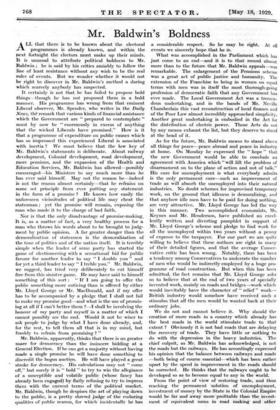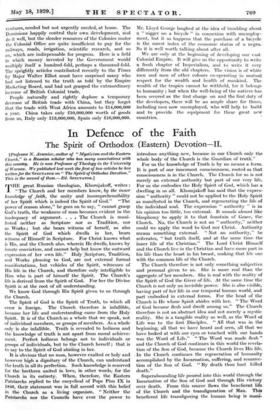Mr. Baldwin's Boldness
ALL that there is to be known about the electoral programmes is already known, and within the next fortnight the electors must make up their minds.
It is unusual to attribute political boldness to Mr. Baldwin ; he is said by his critics amiably to follow the line of least resistance without any wish to be the real ruler of events. But we wonder whether it would not be right to discover in Mr. Baldwin's method a daring which scarcely anybody has suspected.
It certainly is not that he has failed to propose bold things—though he has not proposed them in a bold manner. His programme has wrung from that eminent Liberal observer, Mr. Spender, who writes in the Daily. News, thA remark that various kinds of financial assistance which the Government are "prepared to contemplate" must by now be "enormously in excess of anything that the wicked Liberals have promised." How is it that a programme of expenditure on public causes which has so impressed this experienced Liberal is associated with inertia ? We must believe that the low key of Mr. Baldwin's statements is deliberate. About railway development, Colonial development, road development, more pensions, and the expansion of the Health and Education Services, Mr. Baldwin has allowed—possibly encouraged—his Ministers to say much more than he has ever said himself. May not the reason be—indeed is not the reason almost certainly—that he refrains on some set principle from ever putting any statement in the form of a promise ? He knows how easily the unforeseen vicissitudes of political life may cheat the statesman ; yet the promise will remain, exposing the man who made it to the charge of bad faith.
Nor is that the only disadvantage of promise-making. It is, as a matter of fact, a very healthy process for a man who throws his words about to be brought to judg- ment by public opinion. A far greater danger than the demoralization of statesmen is the demoralization of the tone of politics and of the nation itself. It is terribly simple when the leader of some party has started the game of electioneering with a sensational bid for public favour for another leader to say "I double you" and for yet a third leader to say" I treble you." Mr. Baldwin, we suggest, has tried very deliberately to cut himself free from this sinister game. He may have said to himself something of this sort : "If I am going to offer the public something more enticing than is offered by either Mr. Lloyd George or Mr. MacDonald, and if my offer has to be accompanied by a pledge that I shall not fail to make my promise good—and what is the use of promis- ing at all if I can't better them ?--I shall be involving the honour of my party and myself in a matter of which I cannot possibly see the end. Would it not be wiser to ask people to judge by what I have done already, and, for the rest, to tell them all that is in my mind, but frankly to refrain from promising?"
Mr. Baldwin, apparently, thinks that there is no greater snare for democracy than the insincere bidding at a General Election. If he can get a majority without having made a single promise he will have done something to discredit the bogus aucti9n. He will have played a great stroke for democracy. His calculations may not "come off," but surely it is " bold " to try to win the allegiance of a susceptible and volatile public (whose fancy has already been engaged) by flatly refusing to try to impress them with the current terms of the political market. Mr. Baldwin, though he despises the art of playing down to the public, is a pretty shrewd judge of the enduring qualities of public reason, for which incidentally he has a considerable respect. So he may be right. At all events we sincerely hope that he is.
What was accomplished in the Parliament which has just come to an end—and it is to that record almost more than to the future that Mr. Baldwin appeals--was remarkable. The enlargement of the Pensions scheme was a great act of public justice and humanity. The extension of the Franchise to bring in women on equal terms with men was in itself the most thorough-going profession of democratic faith that any Government has ever made. The Local Government Act was a tremen- dous undertaking, and in the hands of Mr. Neville Chamberlain this vast reconstruction of local finance and of the Poor Law almost incredibly approached simplicity. Another great undertaking is embodied in the Act for the distribution of electric power. Those Acts do not by any means exhaust the list, but they deserve to stand at the head of it.
As for the future, Mr. Baldwin means to stand above all things for peace—peace abroad and peace in industry at home. On Monday he expressed the " hope " that the new Government would be able to conclude an agreement with America which "will lift the problem of disarmament on to the plane of action and not of talk."
His cure for unemployment is what everybody admits is the only permanent cure—such an improvement of trade as will absorb the unemployed into their natural industries. Na doubt schemes for improvised temporary work, on the ground that idleness is demoralizing, and that anyhow idle men have to be paid for doing nothing, are very attractive. Mr. Lloyd George has led the way in this manner. Two accomplished economists, Mr.
Keynes and Mr. Henderson, have published an excel- lently written and diverting pamphlet in support of Mr. Lloyd George's scheme and pledge to find Work for all the unemployed within_ two years without a penny of expense to the taxpayer. For our part we are quite willing to believe that these authors are right in many of their detailed figures, and that the average _Conser- vative critic has been wrong. Notably, there has been a-tendency among Conservatives to underrate the number of men who would be indirectly employed by a huge pro- gramme of road construction. But when this has been admitted, the fact remains that Mr. Lloyd George asks us to believe that at the end of two years of specially invented work, mainly on roads and bridges—work Which would inevitably have the character of" relief" , work— British industry would somehow have received such a stimulus that all the men would be wanted back at their ordinary jobs.
We do not and cannot believe it. Why should the creation of more roads in a country which already has the best roads in the world stimulate trade to that extent ? Obviously it is not bad roads that are delaying the recovery of trade. They have little or nothing to do with the depression in the heavy industries. The chief culprit, as Mr. Baldwin has acknowledged, is not the roads but the railways. He has accordingly expressed his opinion that the balance between railways and roads —both being of course essential—which has been rather upset by the speed in improvement in the roads should be corrected. He thinks that the railways ought to be developed so as to become equal to any in the world.
From the point of view of restoring trade, and thus reaching the permanent solution of unemployment, investment of money by the State in the Colonial Empire would be far and away more profitable than the invest- ment of equivalent stuns in road making and other ventures, needed but not urgently needed, at home. The Dominions happily control their own development, do it well, but the slender resources of the Colonies under the Colonial Office are quite insufficient to pay for the railways, roads, irrigation, scientific research, and so on, which are indispensable for progress. Here is a field in which money invested by the Government would multiply itself a hundred-fold, perhaps a thousand-fold. The sprightly articles contributed recently to the Times by Major Walter Elliot must have surprised many who had not listened to the truth as told by the Empire Marketing Board, and had not grasped the extraordinary increase of British Colonial trade.
People naturally and rightly deplore a temporary decrease of British trade with China, but they forget that the trade with West Africa amounts to 214,000,000 a year. China takes only £10,000,000 worth of goods from us, Italy only 213,000,000, Spain only 210,000,000. Mr. Lloyd George laughed at the idea of troubling about a "nigger on a bicycle" in connexion with unemploy- ment, but it so happens that the purchase of a bicycle is the surest index of the economic status of a negro. .So it is well worth talking about after all.
. We are only at the beginning of developing our vast Colonial Empire. It will give us the opportunity to write a fresh chapter of Imperialism, and to write it very differently from the old chapters. The vision is of white men and men of other colours co-operating in mutual respect for the wealth and health of mankind. The wealth of the tropics cannot be withheld, for it belongs to humanity ; but when the well-being of the natives has been secured as the first charge on and the first duty of the developers, there will be an ample share for those, including men now unemployed, who will help to build and to provide the equipment for these great new countries.













































 Previous page
Previous page